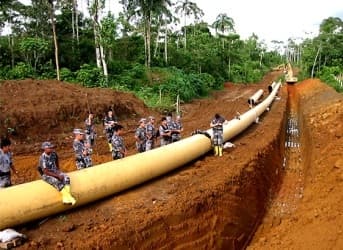South Sudan may have taken most of Sudan’s known energy reserves with it when it voted for independence in 2011, but that doesn’t mean Khartoum has given up on keeping Sudan in the mix of Africa’s key energy players. Eyeing a bounce back, Sudan has been courting energy companies worldwide with the promise of untapped resources in Sudan. And given the relatively raw nature of these unexplored blocks, the strategy could conceivably bear fruit over the medium term.
Over the past year, Sudan has auctioned off several exploration blocks, and these auctions have been well-attended by private and state-owned corporations. For example, a July 2012 auction put nine new blocks into play, attracting bids from over 72 companies. Companies based in Canada, China, Nigeria, Australia, Brazil, and France were awarded concessions, and the auction was hailed as a success by Sudanese government officials.
These auctions have taken place against the backdrop of an active government campaign to promote the advantages of the Sudanese energy market. During a recent trip to Jakarta by Ahmed Ibrahim al-Tahir, the speaker of Sudan’s parliament, an Indonesian official was quoted as saying that the Sudanese government had offered several gas exploration opportunities to Indonesian companies. The government of Sudan has also been courting participation by the China National Petroleum Corporation (CNPC), which, judging by the $1.5 billion loan it extended to the Sudanese government in January, won’t be abandoning its longstanding business partner anytime soon.
Related article: India Mimics China in Seeking African Energy
Block 14 is considered by some to be among the most promising blocks in Sudan at present, and it is being developed jointly by Canada’s Statesman Resources which via its subsidiary Statesman Africa Limited was awarded a seventy-five percent working interest and operatorship, along with Australia’s Sirocco Energy, Express Petroleum and Gas Company Ltd and the Sudan National Petroleum Corporation (Sudapet). The 100,000 sq km block is located in the northwest part of Sudan, along the border with Egypt. Early CPR reports estimate that Block 14 is sitting on up to 1.5 billion barrels of prospective resources, and exploratory wells are expected to be drilled sometime in late 2013. According to reports from Statesman Resources, there are indications in the surrounding areas that suggest Block 14 will end up producing a substantial discovery. To the north lies El Mesaha in Egypt, a field that has just recently been drilled by Petroceltic, Beach Energy Ltd, Hellenic Petroleum SA, and Kufpec. To the south lies Block 12a in Sudan, which is operated by Saudi Arabia’s Al Qahtani, as well as several other partners. An exploratory well has already been drilled in Block 12a, and more activity is planned for the immediate future.
Sudan’s state-owned oil company, the Sudan National Petroleum Corporation, or ‘Sudapet,’ owns a minority stake (ranging from 5-20%) in every oil development in the country. Although Sudapet doesn’t often involve itself in capital-intensive activities such as drilling, it does manage the revenues from Sudan’s oil concessions, while simultaneously nurturing a reservoir of local expertise and know-how. One of the primary aims of Sudapet is to transform foreign investment in Sudan’s energy sector into long-term economic growth potential for homegrown Sudanese enterprises.
The CNPC has been and will continue to be an important player in Sudan’s energy industry. It holds majority stakes in consortiums that preside over several important exploration blocks, such as Blocks 13 and 15 along the coast of the Red Sea near Port Sudan. In 2010, the CNPC drilled two offshore exploration wells in Block 15. The CNPC has also completed several critical infrastructure projects in Sudan, including the construction of the Khartoum Refinery and the Khartoum Petrochemical Plant, as well as the pipelines connecting southern oil fields to Port Sudan. The CNPC will continue to engage with both Sudans, as it has considerable stakes on both sides of the border.
Related article: DRC-RWANDA: M23 Gains Strength in Rivalry Reduction
In terms of the local political situation, it looks like somewhat of an equilibrium is forming between the two Sudans. A border agreement was reached on March 8th which calls for a joint withdrawal from border areas and the immediate establishment of a demilitarized zone. Days later on March 12th, the two sides came to an agreement over how to implement the nine agreements of cooperation that were concluded in September 2012. These agreements will pave the way for not only economic and security cooperation over a wide field, but also a resumption of oil production in South Sudan, which should provide some financial relief on both sides of the border.
The government of Sudan views energy exploration as a doorway to generating foreign currency reserves and developing Sudan’s human capital and expertise. Yet as this article points out, most of its exploration blocks are still in the early phases of development, and the various consortiums that preside over them still need to perform surveys and drill exploratory wells before they can go ahead with high-volume pumping projects. Therefore, while it’s possible that Sudan’s energy industry will make a comeback, it will be one that plays out slowly and over the course of several years. Echoing these tempered expectations, Azhari Abdul Gadir Basbar, the Director of the Department of Oil Discoveries at Sudan’s Ministry of Petroleum, has announced that the government hopes to reach an output of 320,000 barrels a day by 2018.
ADVERTISEMENT
By. Patrick Johnson


















